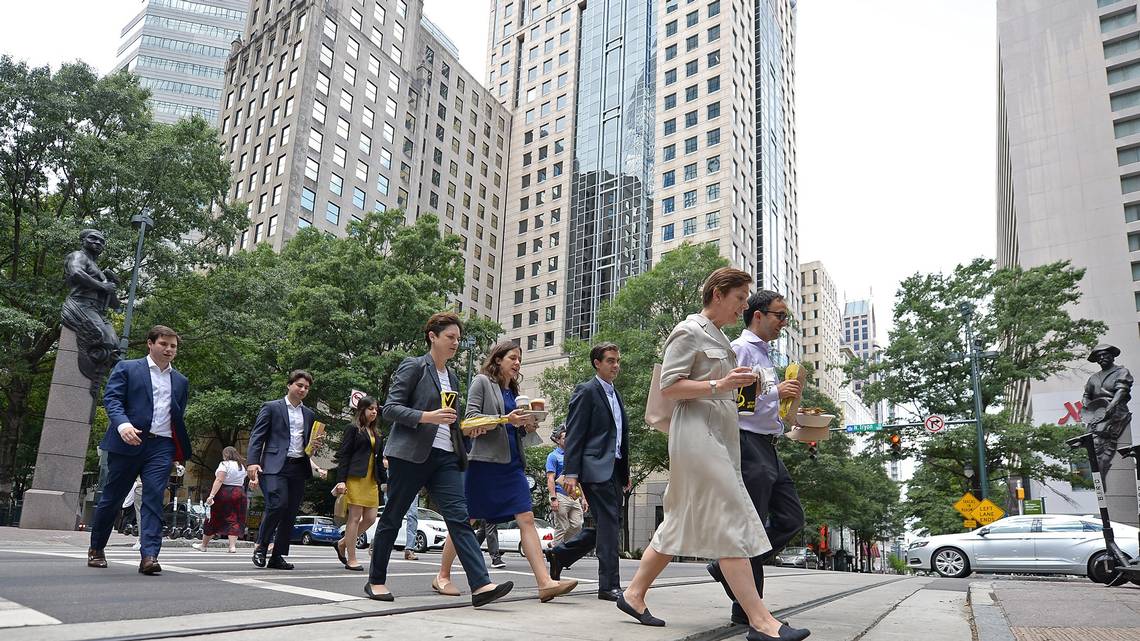Charlotte Observer Op-Ed Featuring Presby Pych

When Hurricane Hugo roared through uptown Charlotte on Sept. 22, 1989, it blew my computer out the shattered windows of my 15th story office. After two weeks of working from home, I was back in the office.
Twelve years later, when the World Trade Center towers collapsed on Sept. 11, the Wall Street Journal office across the street where I worked was badly damaged and evacuated. It took many months, but eventually the staff returned.
But today when workers leave their offices, they may never return. The workplace itself may also disappear.
This occurred to me recently when Wells Fargo announced it was moving out of two uptown towers, including the one where I worked for predecessor First Union. While many employees will be moved to nearby buildings, others haven’t been to their offices since COVID prompted them to work remotely.
I know this is the way things are in a post-COVID world. Many workers don’t want to return to their offices and companies are only too happy to cut costs by paying for less space. But as someone who spent years in an office, I can’t help but lament this new world.
I was saddened when The Charlotte Observer, where I spent eight years of late nights, moved out of its newsroom. Most of the staff still works from home, though some staff members choose to use about a dozen desks and shared meeting rooms in a co-working space.
In a newsroom, perhaps more so than many workplaces, the close interaction of reporters and editors on deadline is intense. For me, irreplaceable. “Where’s that story, Gepfert?” is a shout I’d hear as deadline neared. Fonder memories — the applause when we won a Pulitzer Prize and high fives when a reporter nailed a tough story — became fainter when The Observer’s 1970s-era building was replaced by another sleek office tower.
In a recent Gallup survey, 56% of U.S. full-time employees said they can do their office jobs remotely. Of these, 30% said they don’t want to come into the office anymore and prefer fully remote work, 60% said they want a hybrid arrangement, and 10% prefer to work fully on-site.
My son-in-law, a financial analyst for a large bank, is one of the 30%. Since the outset of COVID he has worked from home, taking over the dining room table with three computer screens. He hopes never to return to the office. He asks why should he go back to getting up at 6 a.m., showering, driving to the office in maddening traffic, paying an outrageous parking fee, eating lunch at his desk, being late for dinner with his wife, and then doing it all over again until the weekend arrives.
But what about interacting with other people? Mary Gail Frawley-O’Dea, executive director of Presby Psych, a nonprofit Charlotte counseling center, is encouraged that 60% of the folks in the Gallup poll prefer a hybrid model. Working from home one or two days a week can relieve the stress associated with commuting and having a more structured workday.
But those benefits cost us the opportunity to regularly interact in-person with colleagues or a favorite deli clerk, or even have beer with friends after work. “Those are also restorative experiences that enrich our lives,” says Dr. Frawley-O’Dea. “Let’s not throw the people out with the cubicles.”
Other costs may include being passed over for promotion because your new boss doesn’t really know you. For cities like Charlotte, the scores of restaurants and other businesses that depend on the thousands of office workers are in jeopardy if many stay at home. The commercial real estate market will take a hit as office vacancy rates increase. The hardening political division we see will only get worse if we rarely see each other.
My hope is the disappearing workplace will be replaced by other ways we come together during the majority of our lives we spend working. When I worked from home for three years, editing remotely, I spent much of the day talking to reporters by phone. But I missed being with them, in the same place. I ultimately hated sitting at my desk in an otherwise empty house, accompanied only by the family dog while my wife was at work.
I couldn’t wait to get back to the office.
Ken Gepfert is a former editor at The Observer and Wall Street Journal.
Read the article online at The Charlotte Observer.
